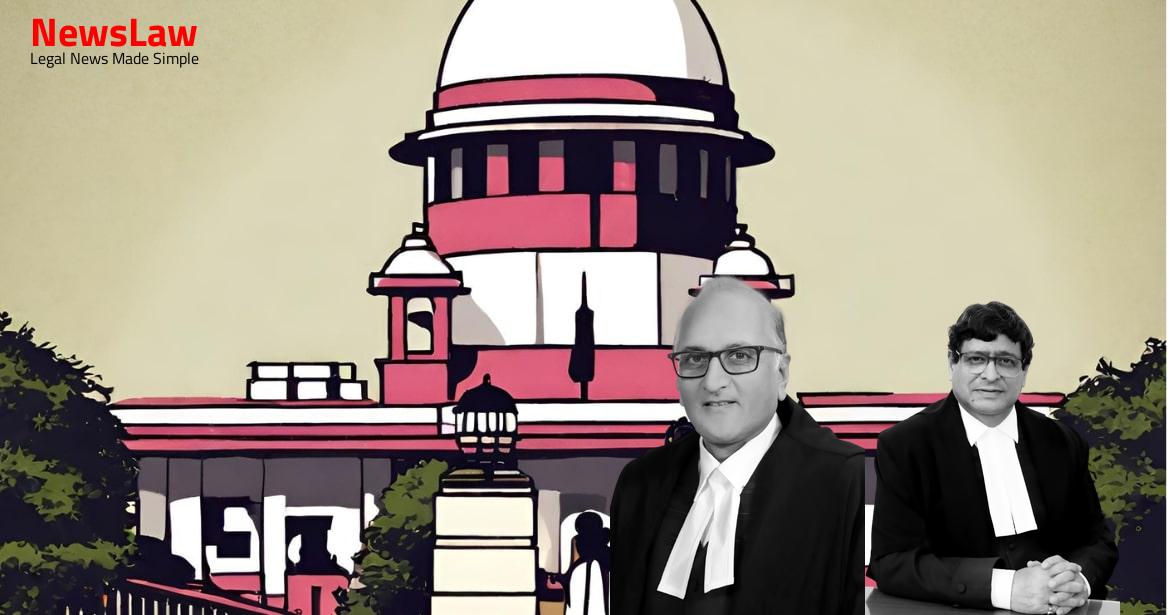In the case of Manmohan Nanda vs United India Insurance Co. Ltd., a dispute arose over the denial of an insurance claim. The respondent, United India Insurance Co. Ltd., alleged that the insured-deceased had suppressed material information about existing policies, leading to the repudiation of the claim. However, the petitioner, Manmohan Nanda, challenged this decision citing the principle of uberrimae fidei or utmost good faith. The National Consumer Disputes Redressal Commission (NCDRC) ruled in favor of the petitioner, highlighting the importance of full disclosure in insurance contracts. This case sheds light on the legal standards governing insurance claims and the duty of parties to act in good faith.
Facts
- The complainant, daughter of Late Sri Siriveri Venkateswarlu, was nominated to receive the death benefits under the two insurance policies.
- The opposite party challenged the State Commission’s order in the National Consumer Disputes Redressal Commission through a Revision Petition.
- The State Commission allowed the consumer complaint, noting the lack of documentary evidence regarding other insurance policies held by the deceased-insured.
- The National Consumer Disputes Redressal Commission (NCDRC) allowed the Revision Petition of the opposite party, overturning the orders of the lower consumer forums and sustaining the repudiation of the complainant’s claim.
- The claim was repudiated due to the insured’s alleged suppression of material facts in the application form regarding existing life insurance policies with other insurers.
- The opposite party found that the insured had substantial life insurance cover with other companies before applying for the policies in question, leading to the repudiation of the claim.
- The insurer emphasized the principle of utmost good faith in insurance contracts and stated that the non-disclosure of information would have significantly impacted their underwriting decision.
- The State Consumer Commission dismissed the appeal and upheld the District Commission’s order due to lack of original, certified, or authenticated documents.
- NCDRC ruled that Supreme Court judgments prevail over NCDRC judgments cited by the State Consumer forum, leading to a revision petition being allowed and the consumer complaint dismissed.
- Opposite parties were deemed incorrect in repudiating the claim as no material was provided to prove the allegation of suppression.
- NCDRC noted that the deceased-insured had undisclosed insurance policies from other insurers, which was supported by evidence.
- In the absence of a claim from the complainant disputing the existence of undisclosed policies, the claim was not deemed vitiated by fraud.
- Based on a judgment in Reliance Life Insurance Co Ltd vs Rekhaben Nareshbhai Rathod, NCDRC found deficiency in services by the opposite parties and directed payment of the insurance amount to the complainant with interest and costs.
- Non-disclosure of pre-existing policies, even if they existed, does not constitute suppression of material facts.
Also Read: Legal Analysis on Transferability of Contractual Obligations
Arguments
- The NCDRC upheld the repudiation of the insurance claim due to alleged material suppression of information about previous policies by the insured-deceased.
- Appellant argues that NCDRC erred as there was no documentary evidence to support the contention of suppression.
- Respondent alleged multiple insurance policies of insured-deceased but failed to provide documentary evidence as proof.
- The undisclosed policies would have impacted the risk assessment by the insurer at the time of issuing the subject policies.
- Legal standard demands utmost good faith in insurance contracts, emphasizing the principle of uberrimae fidei.
- Insured-deceased had a duty to disclose previous policies as required in the application form, but failed to do so.
- Reference made to the case of Manmohan Nanda vs United India Insurance Co. Ltd., (2022) 4 SCC 582 regarding the law on uberrimae fidei.
- Appellant’s counsel argues that the insurer did not prove the existence of other insurance policies while obtaining the policy from them.
- Insurer’s counsel argues that when a warranty is provided in the proposal form, the insurer can avoid liability regardless of the materiality of the information.
- The insured-deceased had an obligation to disclose all facts and materials honestly when filling the proposal form.
- The main consideration in this Civil Appeal is whether the respondent was justified in denying the appellant’s claim due to the suppression of material information about existing policies with other insurers.
- Section 45 of the Insurance Act, 1938, governs the repudiation of insurance claims and has specific provisions about questioning policies beyond a certain period.
- The insured-deceased’s failure to disclose material facts led to the rightful repudiation of the claim.
- Non-disclosure of information indicates malicious intent on the part of the insured-deceased and renders the policy void.
- The judgment in the case of Rekhaben is cited as a similar case where insurance claim denial was upheld due to material information suppression.
- The principle governing life insurance policies is ‘uberrimae fidei’ or utmost good faith.
- Compliance with specific facts in the proposal form is crucial in upholding the validity of the insurance policy.
Also Read: Court’s Legal Analysis on Specific Performance in Tribal Land Transfer Case
Analysis
- Section 45 of the Act imposes restrictions on insurers calling into question a life insurance policy after two years have elapsed.
- The insurer can only challenge the policy if it can be shown that a statement in the proposal was on a material matter or suppressed material facts, and it was fraudulently made by the policyholder who knew it was false at the time.
- Situations where inaccurate or false statements in the proposal, medical reports, or other documents led to the policy issuance cannot be used to question the policy after the specified two-year period, unless specific conditions are met.
- The insurer retains the right to request proof of age at any time, but adjusting policy terms due to incorrect age statements does not constitute calling the policy into question.
- The term ‘Material’ is defined as all important, essential, and relevant information necessary for underwriting the risk to be covered by the insurer.
- The scope and exceptions of Section 45 were explained in various court cases illustrating the limitations on insurers in challenging life insurance policies after the specified time period.
- The NCDRC failed to note that the details of the policies in the table did not specify in whose name the policies were issued.
- The dates of birth and issuance of policies were missing from the information provided.
- Merely mentioning details in the affidavit did not prove the case of the insurance company.
- The details sought in the declaration form were regarding insurance policies with Future Generali and other insurers, as well as details of spouses’ and parents’ insurance.
- The NCDRC concluded that the insured had withheld information about several insurance policies taken from other insurers, which was not appropriately supported.
- The approach of the NCDRC was deemed incorrect in this context.
- Good faith forbids either party from concealing privately known facts to draw the other party into a bargain from ignorance.
- Material facts necessary for disclosure depend on the nature and extent of coverage of risk under a particular type of insurance policy.
- The insurance proposal form must seek all relevant information to be incorporated in the policy as the basis of the contract.
- Ambiguity in an insurance policy should be resolved in favor of the insured following the contra proferentem rule.
- Full disclosure of all relevant facts up to the time of a concluded contract is essential, and non-disclosure that induced the contract terms may lead to avoidance by the insurer.
- The burden of proving any necessary fact lies with the person wishing to give evidence of another fact.
- Relevance of a fact in insurance hinges on whether a prudent insurer’s mind would be affected by its disclosure, particularly regarding the risk involved.
- The duty of disclosure on the insured is crucial, and any fact influencing a prudent insurer is considered material.
- Material facts lead to the inference that the subject of insurance is exceptionally liable to the insured peril, including ‘moral hazard’ and ‘physical hazard.’
- The duty of the insured to observe utmost good faith is enforced through responding truthfully in the proposal form to all relevant information.
- Interpretation of insurance policies must be strict, and the terms agreed upon between both parties must be upheld.
- The contra proferentem rule is applicable in resolving ambiguity in insurance policies, favoring the insured when necessary.
- Materiality of a fact is determined by the circumstances of each case and is a question of fact.
- In case of ambiguity, the document must be interpreted strictly against the grantor in favor of the grantee.
- Reciprocal duties of utmost good faith are owed by both insured and insurer, and strict adherence to the terms of the contract is essential.
- The repudiation of the policy was deemed without any basis or justification.
- The respondents failed to prove that the insured-deceased fraudulently suppressed information about existing policies with other insurance companies when entering contracts in this case.
- There was no suppression of any material fact based on the nature of queries in Query Nos.6.1 and 6.2.
- The present case is distinguished from previous cases as there was no admission by the appellant of any previous policies taken by the insured.
Also Read: Clarification on Reservation for Scheduled Tribes in Union Territory
Decision
- The impugned order dated 22.07.2019 passed by the NCDRC in Revision Petition No.1268 of 2019 is set aside.
- The respondent company is directed to make the payment of the insurance claim under both the policies to the appellant, amounting to Rs. 7,50,000/- and Rs. 9,60,000/-, with interest at the rate of 7% per annum from the date of filing the complaint, till the actual realization.
- Civil Appeal No. 3821 of 2024 stands allowed in the aforesaid terms.
- Parties to bear their respective costs.
Case Title: MAHA KALI SUJATHA Vs. THE BRANCH MANAGER FUTURE GENERAL INDIA LIFE INSURANCE COMPANY LIMITED (2024 INSC 296)
Case Number: C.A. No.-003821-003821 / 2024



